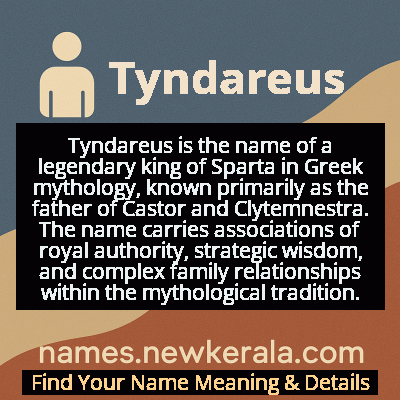Tyndareus Name Meaning & Details
Origin, Popularity, Numerology Analysis & Name Meaning of Tyndareus
Discover the origin, meaning, and cultural significance of the name TYNDAREUS. Delve into its historical roots and explore the lasting impact it has had on communities and traditions.
Name
Tyndareus
Gender
Male
Origin
Greek
Lucky Number
1
Meaning of the Name - Tyndareus
Tyndareus is the name of a legendary king of Sparta in Greek mythology, known primarily as the father of Castor and Clytemnestra. The name carries associations of royal authority, strategic wisdom, and complex family relationships within the mythological tradition.
Tyndareus - Complete Numerology Analysis
Your Numerology Number
Based on Pythagorean Numerology System
Ruling Planet
Sun
Positive Nature
Leaders, ambitious, highly driven, self-reliant, innovative.
Negative Traits
Overly aggressive, domineering, impatient, selfish.
Lucky Colours
Red, orange, gold.
Lucky Days
Sunday.
Lucky Stones
Ruby, garnet.
Harmony Numbers
2, 3, 9.
Best Suited Professions
Entrepreneurs, managers, engineers.
What People Like About You
Courage, determination, leadership.
Famous People Named Tyndareus
Tyndareus of Sparta
Mythological King
Established the Oath of Tyndareus and fathered Helen of Troy
Tyndareus (Literary Figure)
Mythological Character
Central figure in Trojan War mythology and Spartan royal lineage
Tyndareus (Art Subject)
Mythological Icon
Featured in classical and Renaissance art depicting Spartan royalty
Name Variations & International Equivalents
Click on blue names to explore their detailed meanings. Gray names with will be available soon.
Cultural & Historical Significance
Extended Personality Analysis
Tyndareus is portrayed in mythology as a measured and strategic leader whose personality combines royal authority with practical wisdom. His most defining trait is his political foresight, demonstrated by his creation of the Oath of Tyndareus, which shows his understanding of collective security and diplomatic solutions to potential conflicts. He exhibits patience and tolerance in his personal life, particularly in accepting the complicated circumstances of his wife Leda's children, showing emotional maturity and adaptability. As a ruler, he displays the qualities of a stabilizing force—methodical, honorable, and concerned with maintaining order rather than seeking glory or conquest. His personality reflects the ideal of the Greek basileus (king) who rules through wisdom and consensus rather than sheer power. The mythological tradition presents him as a figure who navigates complex family and political situations with dignity, making him a symbol of responsible leadership amid challenging circumstances that would overwhelm lesser men.
Modern Usage & Popularity
In contemporary times, the name Tyndareus remains virtually unused as a personal name and exists primarily within academic and cultural contexts related to Greek mythology. It appears in scholarly works, classical studies programs, and adaptations of Greek myths in various media, but has never gained traction as a given name in modern societies. The name's strong mythological associations, complex pronunciation, and ancient origins make it impractical for everyday use in most cultures. However, it occasionally surfaces in creative works—particularly in fantasy literature, video games, or historical fiction—where authors seek authentic Greek names with rich mythological backgrounds. Its usage is essentially limited to contexts where direct reference to the Spartan king is intended, and it serves more as a cultural artifact than a living name in the modern naming landscape.
Symbolic & Spiritual Meanings
Symbolically, Tyndareus represents the interconnection between personal destiny and historical consequence, embodying the idea that family matters can shape the course of civilizations. His story symbolizes strategic foresight and the importance of binding agreements in maintaining social order, as exemplified by his famous oath. The complex parentage of his children—spanning both mortal and divine lineages—makes him a symbol of mediation between different realms of existence and the blurred boundaries between human and divine in Greek thought. His position as both a biological father and step-father represents the integration of different familial lines and the acceptance of complicated relationships. The mythological narratives surrounding Tyndareus ultimately symbolize how wisdom, patience, and diplomatic skill can navigate even the most challenging personal and political circumstances, making him an enduring symbol of measured leadership in the face of fate-driven events.

